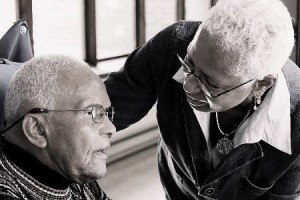It’s such a sad question. ‘How can I communicate with my father, who doesn’t know who I am any more and just sits there, in his own world?’ asked a daughter, whose father had dementia. She wondered if it was worth going to visit him in the care home any more.
There are practica l and spiritual responses to this question. A practical response involves knowing the person well enough to know what was dear to him before he became ill and what his hobbies were. For example, David had loved his dogs and going fishing, so a good idea would be to take in photographs of his dog, or perhaps a little model of a similar type dog, or a magazine about dogs, and sit alongside him showing them to him, talking in a relaxed manner about them. It’s a kind of relaxed burbling, with pauses so he can respond. It’s a bit like fishing from a bridge – throwing out a hook and seeing if it catches. It’s described in our booklet, Visting Someone With Dementia, available from our website.
l and spiritual responses to this question. A practical response involves knowing the person well enough to know what was dear to him before he became ill and what his hobbies were. For example, David had loved his dogs and going fishing, so a good idea would be to take in photographs of his dog, or perhaps a little model of a similar type dog, or a magazine about dogs, and sit alongside him showing them to him, talking in a relaxed manner about them. It’s a kind of relaxed burbling, with pauses so he can respond. It’s a bit like fishing from a bridge – throwing out a hook and seeing if it catches. It’s described in our booklet, Visting Someone With Dementia, available from our website.
Also, as Christians we are we are temples of the Holy Spirit, who is the most powerful communicator in the universe. Deep calls to deep, the Scripture says (Psalm 42:7). ‘Only a call from the depths can provoke a response from the depths, ’Watchman Nee wrote,‘ nothing shallow cannot ever touch the depths, nor can anything superficial touch the inward parts Only the deep will respond to the deep. Anything that does not issue from the depths cannot touch the depths.’[i]
So when we visit people with dementia who have lost the ability to communicate, who have withdrawn into their own inner world, we have the power of ‘simply being’ alongside, knowing that we are carrying the Holy Spirit within us. We can sing a spiritual song or an old hymn; we can read the Scriptures, and we can pray. When we do this we are connecting at an eternal level. We often see ‘silent’ residents in our care homes join in a verse, face alight in worship. In one of our care homes, Lilly, a resident with dementia wouldn’t settle down for the night, so the manager called her friend Betty, another resident, to come and pray with her. Betty was astonished when Lilly prayed for an issue that Betty had kept secret, that absolutely no-one knew about.
Whether or not the person responds, whether or not he knows who you are, if you go with love you will give comfort, even though you may not see it. Christine Bryden, who was diagnosed with dementia over 22 years ago gave a talk at an international conference where she said:
‘‘As I lose an identity in the world around me, which is so anxious to define me by what I do and say, rather than who I am,
I can seek an identity by simply being me, a person created in the image of God.
My spiritual self is reflected in the divine and given meaning as a transcendent being …
As I travel toward the dissolution of myself, my personality, my very ‘essence’,
my relationship with God needs increasing support from you,
my other in the body of Christ.
Don’t abandon me at any stage, for the Holy Spirit connects us. …
I need you to minister to me, to sing with me,
pray with me, to be my memory for me …
You play a vital role in relating to the soul within me,
connecting at this eternal level.
Sing alongside me, touch me, pray with me, and reassure me of your presence,
and through you, of Christ’s presence.
I need you to be the Christ-light for me,
to affirm my identity and walk alongside me’.
[i] http://www.thelastdays.net/deep0.htm















I love this blog. I completely agree with the content.
In my experience of being with folk suffering dementia, once one has accepted that person can no longer communicate in a way that one can make sense of, a good way to try to re-bond and open dialogue is to try and join them in the world that they are in. For example, a lady cuddling a baby doll will love to be told what a charming baby she has and that it too is one of Gods children. You will be amazed how the conversation can go.